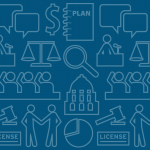In this month’s Act for Public Health legislative update, we address recent state and local efforts to criminalize mask wearing.
A Troubling Trend
At the height of the COVID-19 pandemic, many jurisdictions enacted mandatory disease mitigation measures, including vaccination, isolation, social distancing, and masking. While effective,[1] these measures were generally abandoned after COVID-19 vaccines became widely available, even though rates of viral transmission remained high. Recently, a troubling trend has developed: cities and states have begun promoting mask bans (see the examples listed below).
What’s behind these bills? Mask bans often purport to be about public safety and the need for law enforcement officers to identify people engaging in criminal actions. However, in the United States, mask bans have historically been used for other purposes — for example, to suppress unpopular opinions or disfavored groups under the guise of promoting safety.
Health experts have criticized the rise in calls for mask bans. Laws banning masks are often poorly drafted and difficult to enforce. Further, they raise constitutional concerns about free speech and the right to protest, selective enforcement, and due process — particularly for groups that already experience overpolicing and overenforcement.
Harmful Impact
Current efforts to ban face masks will have an inequitable impact. For example, mask bans risk the health of people with disabilities that make them more prone to serious negative health outcomes from conditions prevented or mitigated by mask wearing. As a result, such bans can result in exclusion of people with disabilities from public life, including protests. Even with medical exceptions allowing masks, people with disabilities would be forced to disclose private, sensitive medical information to justify their mask use. Black, Indigenous, and other people of color (BIPOC), already subject to overpolicing and overenforcement of criminal laws, may also face disparities in enforcement of mask bans.
A Better Way
We believe that equitable implementation and enforcement is a necessary framework that should inform policymaking. Equitable implementation and enforcement mean that policymakers try to mitigate unintended consequences and prevent public health regulations — like those related to mask wearing — from intentionally or unintentionally harming communities. An iterative, transparent, and inclusive approach to policymaking is required to best meet community needs and achieve policies’ intended goals.
Examples
Legislative efforts to ban face masks began after a wave of college protests opposing the war in Gaza:
- In North Carolina, the General Assembly recently passed state legislation that initially repealed pandemic-era exceptions allowing people to wear masks to protect their health. Ultimately, the medical exemption was restored, although the legislation also increases the severity of punitive measures for crimes committed while masked.
- In Los Angeles, both Mayor Karen Bass and members of the city council have suggested that the city needs to consider laws on wearing masks at protests.
- In New York, Governor Kathy Hochul and New York City Mayor Eric Adams have promoted state and local laws banning the wearing of masks on public transit and at protests, arguing that people are using prevention of COVID infection as a pretense to avoid identification while committing crimes. These proposed bans may also interfere with individuals’ ability to protect themselves from environmental harms identified in health advisories issued by New York City’s government over the summer.
- In Nassau County, NY, legislators passed a bill to ban face masks; violators could face jail time. While the legislation includes exceptions for health or religious reasons, opponents pointed out a lack of guidance on implementation and enforcement. A disability rights advocacy group has filed a federal class-action lawsuit to challenge the law, alleging that it violates the Americans with Disabilities Act, the Rehabilitation Act, and New York state law.
- In Ohio, the state’s attorney general warned university presidents that existing laws that prohibit face coverings while committing a misdemeanor could be used to punish students who wear face masks while attending protests. The letter cites a little-used law and fails to acknowledge the use of masks to protect health.
Related Reading
Several organizations and law schools have recently published guides on participating safely in protests. Some have also created guides on best practices for creating a safe environment for protest. For example, the Institute for Constitutional Advocacy and Protection at Georgetown University Law Center published Protests & Public Safety: A Guide for Cities & Citizens.
Connect with Act for Public Health
Connect with Act for Public Health for more information on shifts in public health authority — taking it away, giving it to other governmental actors, making it harder for staff and officials to do their jobs, or co-opting public health authority for uses that are not proven to improve the public’s health.
Note
[1] Properly worn face masks are a simple and effective precaution against a host of airborne viruses, including COVID-19, influenza, RSV, and viral pneumonia. A 2021 study found that wearing a surgical mask reduced the odds of testing positive for COVID-19 by 66%; wearing an N95 or KN95 mask reduced the odds of testing positive for COVID-19 by 83%. Households that consistently masked during one study period reported a 50% reduction in the rate of non-COVID respiratory illness compared with previous years, and rates rose again as mitigation practices were relaxed. Masking can also protect against health harms such as allergies and particulate pollution. During times of peak viral spread, widespread mask wearing indoors can render community spaces safer for everyone, especially those who are most vulnerable to severe outcomes, including young children, older people, and people who are immunocompromised.
8/29/2024
